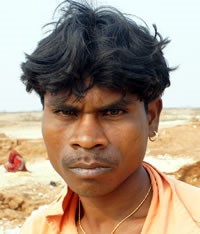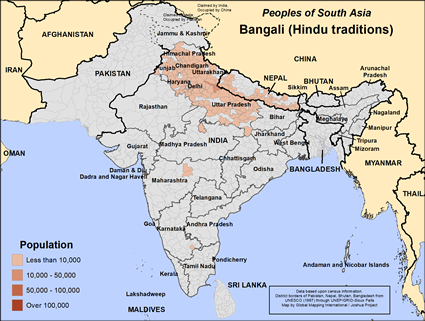Bangali (Hindu traditions) in India

Photo Source:
Copyrighted © 2026
Isudas All rights reserved. Used with permission |

Map Source:
People Group data: Omid. Map geography: UNESCO / GMI. Map Design: Joshua Project.
|
| People Name: | Bangali (Hindu traditions) |
| Country: | India |
| 10/40 Window: | Yes |
| Population: | 74,000 |
| World Population: | 101,000 |
| Primary Language: | Hindi |
| Primary Religion: | Hinduism |
| Christian Adherents: | 0.04 % |
| Evangelicals: | 0.00 % |
| Scripture: | Complete Bible |
| Ministry Resources: | Yes |
| Jesus Film: | Yes |
| Audio Recordings: | Yes |
| People Cluster: | South Asia Dalit - other |
| Affinity Bloc: | South Asian Peoples |
| Progress Level: |
|
Introduction / History
The Bangali are a semi-nomadic tribal people who live in north India. They are distinct from the large Bengali people who live in northeast India and Bangladesh.
The Bangali make their living by charming snakes, working as landless farm workers, in animal husbandry and by gathering forest products like roots. The Indian government has tried to stop their wandering ways and live in fixed villages.
Bangali are a Scheduled Caste, meaning they are eligible for public jobs and special consideration for university admission. Most Bangali cannot read or write. They are among the poorest peoples of north India.
The main language of the Bangali is Hindi. Smaller groups speak Kanauji and Eastern Punjabi.
Most Bangali live in the Indian state of Uttar Pradesh. Others reside in other north Indian states such as Uttarakhand, Punjab, Himachal Pradesh and Haryana. More Bangali live in Nepal.
What Are Their Lives Like?
The Bangali live a subsistence existence in India. They travel from place to place raising their animals and trying to find day labor jobs so they can feed their families. They sell their animals to buy food and other necessary items. They live in portable huts made of reeds and mud. Since their traditional occupation of snake charming is disappearing more and more Bangali are working as day agricultural laborers. If these jobs are few, the Bangali face the prospect of starvation.
The Bangali marry within their group. Families arrange marriages. Sons inherit what little property the father possesses.
Caste councils settle legal disputes and promote their interests with outsiders.
The Bangali are not vegetarians but will not eat beef. Meat is normally reserved for holidays. The main foods of the Bangali are rice, wheat, lentils and vegetables.
What Are Their Beliefs?
The Bangali people are officially Hindu, though they have their own traditional beliefs as well.
What Are Their Needs?
The Indian government disapproves of their hunting animals and gathering products from the forest so that source of food is almost gone. They need to find new ones.
Prayer Points
Pray for spiritual discernment and a desire for truth.
Pray for loving workers to go to them.
Pray for Bangali disciples who will make more disciples.